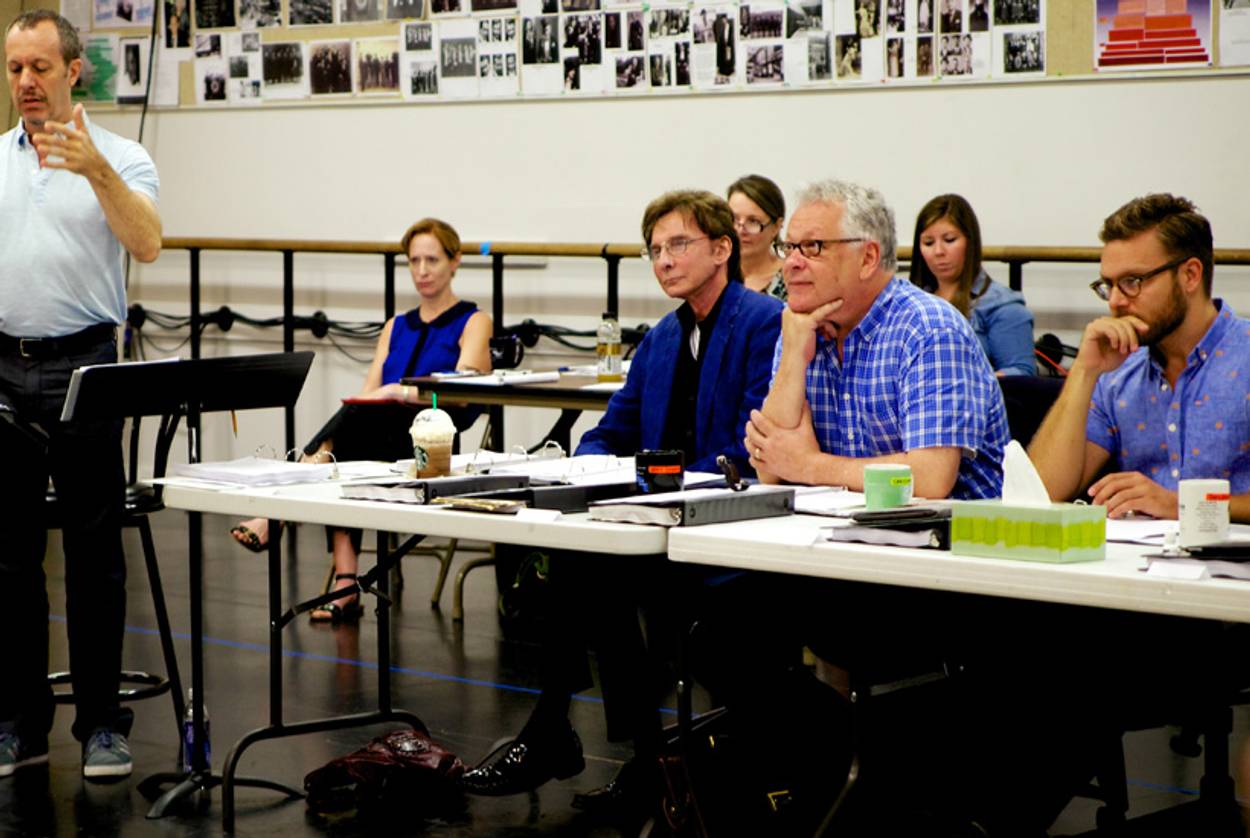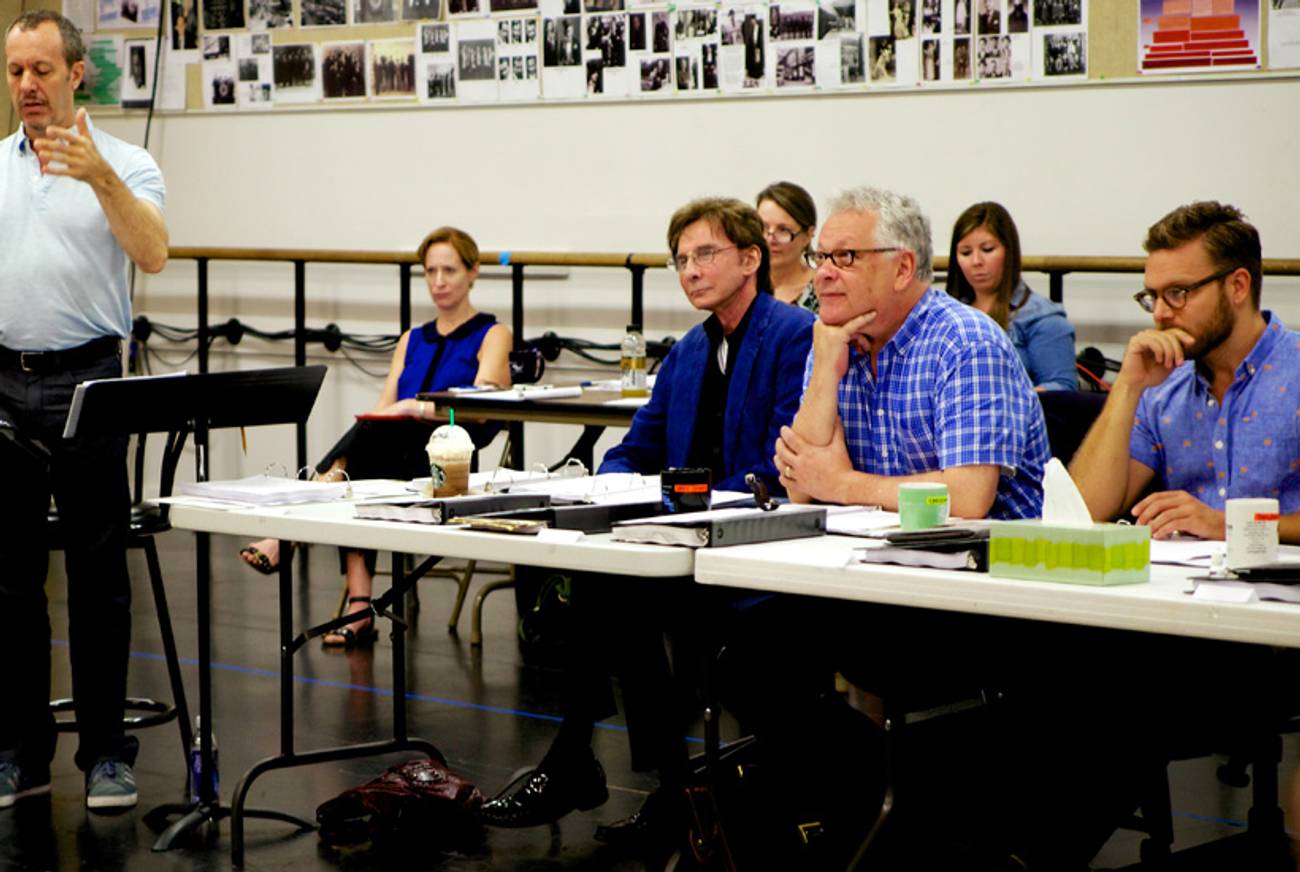His Name Was Hitler, He Was a Showgirl: Barry Manilow’s New Musical
‘Harmony,’ opening in Atlanta next week, reimagines a famous Weimar-era song-and-dance troupe in major and minor keys




Barry Manilow and his lyricist partner Bruce Sussman have attempted various musicals over the years, including a story based on their hit song Copacabana. In the early 1990s, Sussman saw a documentary that riveted him, about a German singing group. The film portrayed how a Jewish actor in Berlin recruited five singers—two Jewish and three non-Jewish—to form a musical group that offered something unprecedented in live performance: complex six-part harmonies, vocal imitation of instruments, and physical comedy onstage. The Comedian Harmonists, as they were called, became a musical sensation in the late 1920s, but their rise to fame coincided with Hitler’s rise to power and restrictions against Jewish artists in Germany. The film immediately interested Sussman, a self-proclaimed “history buff,” and he quickly located a copy to send to Manilow. The result of their subsequent collaboration is a new musical, Harmony, which opens on Sept. 6 at the Alliance Theatre in Atlanta.
At a rehearsal space in New York’s Times Square where I met Manilow and Sussman, the cast of Harmony was at work, practicing the show’s opening number with the director, Tony Speciale. I was led to the lounge area where Manilow was standing, wearing sunglasses and smoking an electronic cigarette. His custom-made clothes, tan skin, and coiffed hair suggested that he was preparing to take stage rather than give an interview. But when he sat down with Sussman and me, his demeanor softened. When he first saw the movie, he said, he was blown away by the brilliance of the Harmonists and was shocked that he had never heard of these talented artists before.
“I remember vividly when I sent you the first CD,” Sussman said with a laugh to Manilow, “and you were in your car driving down Santa Monica Boulevard, and you flipped out and called me on your car phone.” Both Manilow and Sussman were excited by the prospect of telling a story about the Harmonists, whose legacy outside of Germany had been largely forgotten. They found that there was a Comedian Harmonists’ archive in Berlin and began to use primary sources for their research. Manilow felt purposeful in “diving so far in. Because they were the first,” he told me. “They were the architects of the kind of group singing that we love so much today.”
To compose the score, Manilow dived into the music of the era. “I immersed myself so deeply in the ’20s and the ’30s,” he said. “My job was to write an authentic-sounding score that didn’t sound like a Barry Manilow record that paid tribute to the time and place. This was a style of music that I had never thought about let alone written. So, it was about a year before I even put a note down.”
Reflecting on the setting of their musical—Weimar Germany—Manilow said, “Maybe it was in the water because they were all at the top of their creativity.” Sussman added, “This is the period of Kurt Weill and Einstein and all of these amazing people who ultimately fled, and here we have this group of Jews and gentiles facing that decision of what to do.”
While both Sussman and Manilow are Jewish, neither had much interest in doing a “Jewish musical,” or a work about the Holocaust. “This is not a Holocaust musical. A lot of writers have gotten that wrong,” Manilow asserted. For his part, the Jewish aspect of the story seemed less engaging than his fascination with 1930s music. As he put it, “We chose a project that spoke to us.”
Sussman took a slightly different view. “The Jewish stories tend to appeal to me the most,” he said. “I was actually exploring another project that I thought wouldn’t have a Jew in it, and I researched and got to a critical point, and suddenly there’s a big old Jewish theme. And I said, ‘Well, I guess it’s just going to be there for me wherever I turn.’ ” Sussman’s knowledge of Jewish cultural references was evident as we talked, and he admitted that the dialogue in Harmony is laced with Jewish humor. In one scene, Roman Cycowski, a cantor turned Harmonist member, says that he is looking forward to finally “singing in a major key,” a line that Sussman says always gets a laugh. Jewish jokes generally do well with theater audiences, as anyone knows from seeing The Producers. But that humor felt specifically purposeful to Sussman for this musical because the Harmonists wove comedy so deftly into their performance.
Cycowski, the last surviving member of the Comedian Harmonists (he died in 1998 at age 97), is the narrator of the musical, guiding the audience through his memory of how the singers first met, how they became stars, and how Germany became untenable for the group’s Jewish members. Manilow and Sussman hand-picked Speciale to helm the project because his directing style leans toward representational, poetic, and often dreamlike storytelling, an aesthetic that would serve this “memory play.” For Speciale, the script to Harmony, “had all the elements that I love in theater. It was theatrical, it was expressionistic, there were flashbacks, it spanned 28 different locations over nine years, it had 40 different characters. It was so epic, yet it had a cast of only 19 people. Nineteen may sound big, but it’s not a lot when you think of musicals.”
Harmony’s epic nature was also reflected in the show’s development process. The theaters producing Harmony this year—the Alliance Theatre in Atlanta and Center Theatre Group in Los Angeles (which begins performances in March)—have billed the show as a “new musical.” But Harmony was actually first produced in 1997 at La Jolla Playhouse in southern California. It was, at the time, a new venture for Manilow and Sussman, and they hardly thought of the work as complete. The production received promising reviews, however, which bolstered their intentions to bring it to Broadway. But the show dissolved before its intended Broadway opening in 2004 and culminated in a lawsuit where Manilow and Sussman fought to reclaim the rights from the show’s producers. It would be inaccurate to call this new production a world première, but this version is, in many ways, the first fully realized production of Harmony to be seen by audiences.
“I’m very aware of the pressure that is on this piece because it’s been through so much,” Speciale remarked. “So, I feel a great responsibility to shepherd this project, to allow the authors to see it for what it is, which I think is a masterpiece.” While Broadway still waits, the main objective to Manilow, Sussman, and Speciale is to turn out stellar productions in Atlanta and Los Angeles and to thereby set Harmony back in the right key.
Manilow and Sussman hope that Harmony has the potential to be a culturally specific show with universal ideas, a Jewish musical with broader resonance. “I hope the audience likes it because I like it and Bruce likes it,” said Manilow as our conversation came to an end. “I hope they like it, but it won’t change my feeling for it. I just want to see it one more time.”
***
Like this article? Sign up for our Daily Digest to get Tablet Magazine’s new content in your inbox each morning.
Lonnie Firestone writes about theater, and lives in Brooklyn, New York.
Lonnie Firestone writes about theater, and lives in Brooklyn, New York.